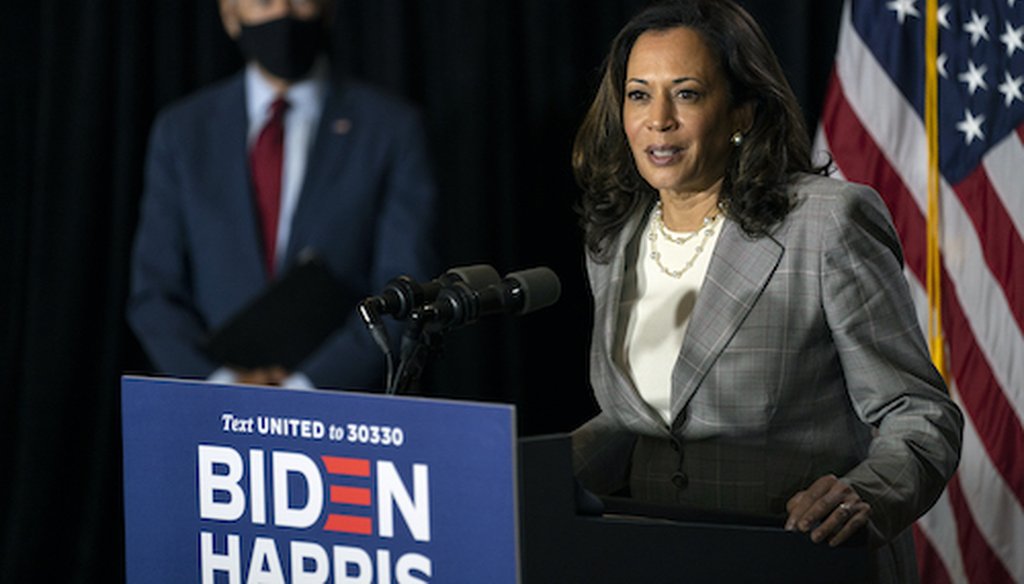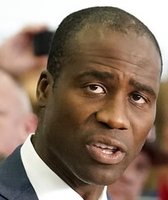Stand up for the facts!
Our only agenda is to publish the truth so you can be an informed participant in democracy.
We need your help.
I would like to contribute

Democratic presidential candidate former Vice President Joe Biden stands left as his running mate Sen. Kamala Harris, D-Calif., speaks at the Hotel DuPont in Wilmington, Del., Thursday, Aug. 13, 2020. (AP)
If Your Time is short
-
Racial identity in the United States is very complex, experts told us, and identifiers often contain different meanings to different people.
-
Harris has said before that she simply identifies as “American,” although her life was ingrained in African American culture.
-
The suggestion that Jamaicans aren’t connected to Africa is wrong. The vast majority of Jamaicans hail from sub-Saharan Africa, according to both census data and genetic studies.
In a joint speech delivered in Wilmington, Del., former Vice President Joe Biden and Sen. Kamala Harris made their campaign debut as running mates.
The pair highlighted the historical significance of Harris being the first Black woman, and first person of Indian descent, to be nominated for national office by a major party in the United States.
"This morning, all across this nation, little girls woke up, especially little Black and brown girls who so often may feel overlooked and undervalued in our society," Biden said at the event. "But today, maybe, just maybe, they’re seeing themselves for the first time in a new way."
But since the announcement, posts on social media have misrepresented Harris’ lineage and have criticized her for identifying as "African American" because she has an Indian mother and Jamaican father.
This is a poor understanding of history, and may also reflect the fluid nature and various interpretations of racial identity in the United States, where conversations about race have evolved over the course of its history.
To address this, we consulted experts in Caribbean and Africana studies, political science professors and anthropologists to learn more about the African American identifier, racial identity in the U.S. today, and how Harris’ cultural and genetic background comes into play.
A little bit on her background
Harris was born in Oakland, Calif., in 1964, to parents Shyamala and Donald Harris.
The daughter of two immigrants — her father came from Jamaica, her mother from India — Harris grew up in a Black middle-class neighborhood in Berkeley, where her parents would often join civil rights protests.
Her father, Donald Harris, was born in Jamaica and immigrated to the U.S. after he got into the University of California-Berkeley, Kamala Harris wrote in her autobiography, "The Truths We Hold: An American Journey."
Kamala Harris’ mother, Shyamala Harris, was born in Chennai, India, and moved to California after graduating from the University of Delhi to pursue a doctorate in nutrition and endocrinology at Berkeley.
RELATED: Who is Kamala Harris? Joe Biden’s pick for vice president
The couple separated around the time Kamala Harris was five and divorced a few years later, Harris wrote in her book.
Kamala Harris lived in California until she was in middle school, when she moved to Montreal after her mother was offered a teaching position at McGill University. She went to college at Howard University, an historically Black university, in Washington D.C. and earned her law degree at the University of California in 1989.
Jamaican descent and the trans-Atlantic slave trade
Several experts told us that the implication that Jamaicans aren't African or connected to Africa is wrong on its face.
According to a 2011 census, 92.1% of Jamaicans are Black, with genetic studies showing that the vast majority are descendants of people from sub-Saharan Africa.
"Jamaica is a country where more than 90% of the population is of African ancestry," said Judith Byfield, a professor at Cornell University who teaches Caribbean and African history. "So the idea that because her dad is Jamaican she has no African ancestry is completely false."
Byfield said people scrutinizing Harris’ ethnic background often conflate several different categories.
"Jamaican is a national identity at the same time that it’s also a cultural identity and you can say the same for her Indian heritage," she said. "Those are her parents, but she's born here, and I think for first generation people, there's always a bit of tension between the extent that they are American, and by the extent they've been shaped and framed by their parents’ cultural affiliations."
The African diaspora refers to the mass dispersion of peoples from Africa during the trans-Atlantic slave trade — and it wasn’t a one-stop route to the United States. It took millions of African people to different regions throughout the Americas and the Caribbean.
In a recent op-ed, New York Times columnist Jamelle Bouie wrote about how Jamaica was home to a brutal and violent plantation system, and was at the center of the slave trade.
"Many Jamaicans trace their origins directly to slavery and the mass importation of African captives," Bouie wrote. "Based on a genealogical account by her father, there is a strong chance Kamala Harris is one of them. What’s more, many descendants of enslaved people in the Americas have European ancestry on account of the pervasive sexual violence whites perpetuated wherever slavery took root."
RELATED: Looking at claims Kamala Harris is the descendant of a slave owner
Some anthropologists and ethnographers consider the African American identifier more broadly to encompass Black individuals who come from a wide range of countries, while others see it as being limited to Americans descended from people who were enslaved in America.
Tracie Canada, a socio-cultural anthropologist and postdoctoral research associate at the University of Notre Dame, told PolitiFact that the term African American "has been imbued with meaning, often to speak to a certain experience in this nation. But generally speaking, the term refers to Black people born in the U.S."
Keneshia Grant, an associate professor of political science at Howard University, said she saw distinctions between the terms Black and African American.
"As I use the term and think about it, African American refers to people who are of Black American descent," she said. "When you think of the American descendants of slavery, that’s the more colloquial use of the term. But Kamala Harris is a Black woman, and I think there’s a distinction between Black and African American, where Black is a more catch-all than African American."
But Grant also said that claims that suggest Jamaican people are not African are unaware of the global reach of slavery.
"Slavery impacted many people from Africa, and we went to many places," Grant said. "Sen. Harris’ father’s people got dropped off in Jamaica. Mine got dropped off in Haiti. The African diaspora is huge, and it is worldwide, so to suggest that a Jamaican is not African or connected to Africa is not acknowledging the vestiges of slavery."
The cultural impact on racial identity in the U.S.
Harris told the Washington Post in 2019 that she simply identifies as "an American," and that she’s been comfortable with her identity from an early age, something she credits to her Hindu immigrant single mother, who adopted Black culture and immersed her daughters in it. Harris said that she grew up embracing her Indian culture while living a proudly African American life.
She told the Post that she hasn’t spent much time dwelling on how to categorize herself, but being forced to define herself was more of a struggle when she first ran for office.
We have plenty of ways to categorize people, Canada told us, but racialized categorization has structural implications.
"Anti-black racism, anti-black violence, those are the things that actually matter," Canada said. "Those are systemic problems and structural issues, so no matter how she identifies or how we identify her, is she going to be implicated in that systemic problem?"
Dianne Pinderhughes, a professor of Africana studies and political science at Notre Dame, told PolitiFact that the subject of racial identity is complex, especially for Harris, becauses she was immersed in African American culture and community since she was very young.
"You have a person who was socialized from her earliest years to be socially, culturally African American and also was supported and immersed in African American organizations," Pinderhughes said.
"I think the way race is played out in the United States, it’s just been the case for centuries, that people who have some color are usually assimilated in an African American community of some sort, and that community recognizes people who are willing to look in the mirror and recognize them as well."
Another aspect of racial identity in the U.S. has a lot to do with where a person grew up or now lives. An individual’s local community tends to weigh heavily on how they identify themselves, experts said.
For example, a first generation American with Jamaican heritage may identify as Jamaican American or Black in a less blended area, while another person with the same heritage living in a different part of the country may identify as African American.
"Is Kamala Harris Black? Absolutely. Is she African American? It depends on who you talk to and how they define it," Grant said. "For context, I'm from South Florida, and in my neighborhood you would not call a person who is Jamaican an African American, you would call them Black. African American descended from Black American people. But in D.C., I’m not ever talking about that fine distinction."
It’s different for Byfield, who is of Jamaican descent and grew up in Queens. She said that her experience involved a blended community of Black individuals who came from countries all over the world. But they banded together in their identity and shared experiences. That may have been Harris’ experience as well.
"She has chosen to define herself in terms of the American landscape, and I think those of us who have had a multinational, cultural lifestyle, we've all had to figure out individually how to come to terms with it," Byfield said. "You have all these different groups from different African countries, as well as Caribbean countries. African American community in the U.S. is not from one place, everyone is from everywhere."
Our Sources
Facebook post, Aug. 3, 2020
PolitiFact, Who is Kamala Harris? Joe Biden’s pick for vice president, Aug. 11, 2020
Washington Post, ‘I am who I am’: Kamala Harris, daughter of Indian and Jamaican immigrants, defines herself simply as ‘American’, Feb. 2, 2019
PolitiFact, Kamala Harris is eligible to be president, Aug. 11, 2020
Amazon.com, The Truths We Hold: An American Journey, Jan. 8, 2019
Poynter.org, If Kamala Harris is also of Asian descent, why does the press only label her ‘Black?’, Feb. 10, 2004
New York Times, Black Like Kamala, Aug. 14, 2020
US National Library of Medicine, Interdisciplinary approach to the demography of Jamaica, Feb. 23, 2012
2011 Census of Population and Housing - Jamaica, Accessed Aug. 12, 2020
Phone interview, Dianne Pinderhughes professor of Africana studies and political science at the University of Notre Dame, Aug. 11, 2020
Phone interview, Tracie Canada socio-cultural anthropologist and postdoctoral research associate at the University of Notre Dame, Aug. 13, 2020
Phone interview, Judith A. Byfield history professor at Cornell University, Aug. 13, 2020
Phone interview, Keneshia Grant assistant professor of political science at Howard University, Aug. 13, 2020










































